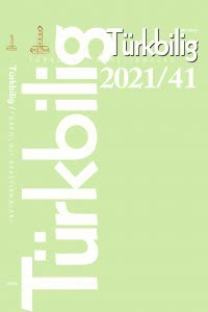Yabancı / İkinci Dil Öğretiminde Doğal Yöntem ler ve Doğal Yaklaşım lar Üzerine
Doğal Yaklaşım lar , Doğal Yöntem ler , doğallık, dil öğretim yaklaşımları ve yöntemleri, yabancı dil öğrenimi, ikinci dil edinimi
On The Natural Method s And The Natural Approache s In Language Teaching
The Natural Approach es, Natural Method s, naturality, language teaching approaches and methods, foreign language learning, second language acquisition,
___
- ASHER, James J. (1968), The Total Physical Response Method for Second Language Learning, file:///C:/Users/Pc/Downloads/AD0674868%20(1).pdf (Rapora Erişim Tarihi: 02.02.2018)
- ASHER, James J. (1969), “The Total Physical Response Approach to Second Language Learning”, The Modern Language Journal, Vol. 53, No. 1 (Jan., 1969): 3-17.
- BROWN, H. Douglas (2001), Teaching by Principles: An Interactive Approach to Language Pedagogy, Longman.
- DEMİRCAN, Ömer (2013), Yabancı Dil Öğretim Yöntemleri, Der Yay.
- HOWATT, A. P. R.; WIDDOWSON, H. G. (2009), A History of English Language Teaching, Oxford University Press.
- KRASHEN, Stephen; TERRELL, Tracy D. (2000), The Natural Approach, Longman.
- KUMARAVADİVELU, B. (2003), Beyond methods: macrostrategies for language teaching, Yale University Press.
- MACKEY, William Francis (1965), Language Teaching Analysis, Longman.
- RİCHARDS, Jack C.; Schmidt, Richard (2002), Longman Dictionary of Language Teaching & Applied Linguistics, Longman.
- RİCHARDS, Jack C. and Rodgers, Theodore S. (2007), Approaches and Methods in Langage Teaching, Cambridge University Press.
- STERN, H. H. (1983), Fundamental Concepts of Language Teaching, Oxford University Press.
- STETTER, R.; MÖHRİNGER, S.; PULM, U. (2011), “A Comparison of Evolutionary and Revolutionary Approaches in Mechatronic Design”, In: Proceedings of the 18th International Conference on Engineering Design (ICED 11), Vol. 1: 221-232.
- STEVİCK, Earl W. (1991), Humanism in Language Teaching, Oxford Univesity Press.
- SWEET, Henry (1964), The Practical Study of Languages, Oxford University Press.
- ISSN: 1302-6011
- Yayın Aralığı: 2
- Başlangıç: 2000
- Yayıncı: Doç. Dr. Bülent Gül
Yabancı / İkinci Dil Öğretiminde Doğal Yöntem ler ve Doğal Yaklaşım lar Üzerine
Toplumsal Geçiş Törenlerinin Tekno-Kültürel Bağlamı Üzerine Bir Değerlendirme
Kayıp “ Balbınarı Yaylası”nın Yeri ve Yayladaki Sultanın Kimliği Meselesi: Kanunî Mi, Timur Mu?
Yenisey Yazıtlarından Tuba III E 51 Yazıtının Son Satırı Ya Da Balbar Nedir
Kitapların Günümüze Taşıdıkları
Deli Dumrul Hikâyesine Yeni Yaklaşımlar
Füyûzat Dergisi ve 1905 Sonrası Azerbaycan`da Türkçe Meselesi
Dil-Millet İlişkisi Bağlamında Türkçeyi Bilgiden Bilince Konu Edinen Şiirler
